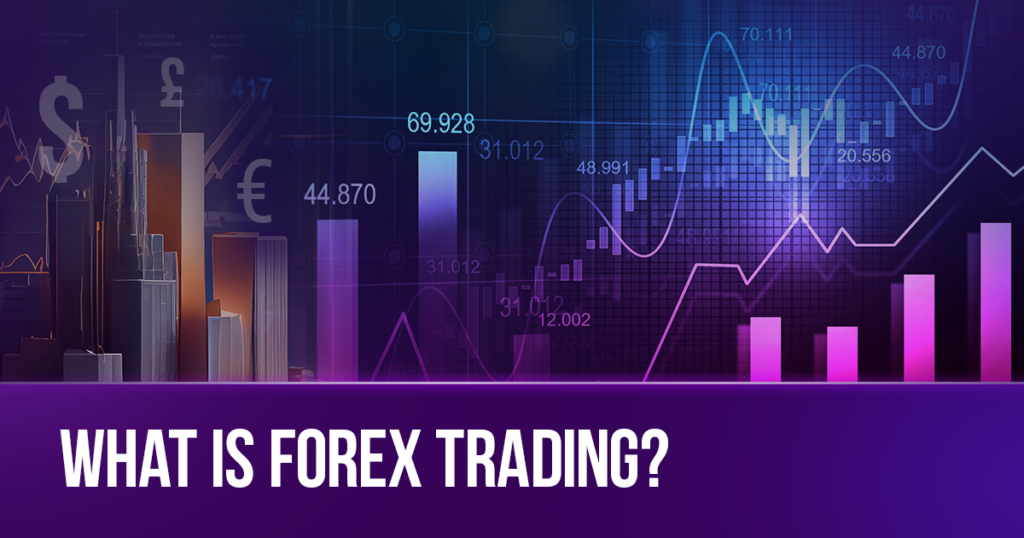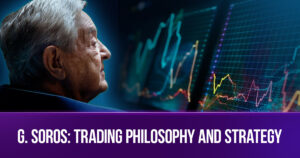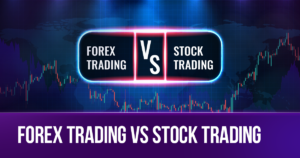What is the Forex market?
Forex (FX) trading is also known as foreign currency trading. Foreign exchange is the process of converting one currency into another for several purposes, typically for business, trade, or travel.
The foreign exchange market is where currencies are traded.
The Forex market with a daily trading volume of $6.6 trillion tends to be the largest and most liquid market, as exchange rate pairs; currencies are traded against one another. For instance, the currency pair EUR/USD is used to trade the Euro against the US dollar.
Currencies are essential to buy and sell goods and services across international borders and conduct foreign business and trade.
Suppose you have traveled abroad where the local currency is different from yours. In that case, you must experience foreign exchange between your home currency and the local currency to purchase goods while you are on vacation.
When businesses manufacture products to sell abroad, they face the same situation. A product manufactured in the EU with a cost of €100 but sold in the USA for US dollars at a fair price of $150, the company will profit accordingly to the EUR/USD exchange rate. If the current exchange rate stands at 1.0000, meaning €1 is in parity with $1, then the company makes €50 profit per sale. Perhaps the US dollar begins to depreciate and its value falls to a 1.2000 EUR/USD exchange rate, which means it now costs $1.20 to buy €1.00, then $150 translated to Euros would only result in ($150/1.2000) €125, with only half as profits as previously.
Companys can lower risk from foreign currency trading to hedging in the futures market.
Traders and investors also participate in FX trading to earn interest for holding positions, known as swap trading, or profit from changes in the exchange rate.
Most retail traders invest for speculative reasons. The supply and demand for currencies are influenced by a number of variables, including interest rates, trade flows, tourism, economic outlook or geopolitical risk, which results in daily volatility in the forex markets. Traders receive daily opportunities by speculating on currency pairs’ price rises or fallings and trading these changes on trading platforms with regulated brokers.
Forex Market
The forex market used to be dominated by large banks, institutional firms and high-net-worth individuals but electronic trading is more available today than ever before, so retail trading world increased rapidly. Forex is traded on the spot market, also known as the cash market or over-the-counter (OTC) market, where instruments are traded directly between counterparties without a central exchange. OTC markets do not have physical locations; instead, trading is conducted electronically.
The forex market, which serves a variety of market participants, is open twenty-four hours a day, five days a week, starting on Sunday in New Zealand, and ending on Friday afternoon in the US.
It’s important to keep in mind that daily trade volume often rises during market hours, especially when the two market sessions overlap.
Forex Basics Expressions
Major currency pairs: are the most actively traded instruments. This market has the most liquidity. Major markets all include the US dollar, such as EUR/USD, AUD/USD, GBP/USD, USD/JPY, USD/CAD, USD/CHF, NZD/USD
Minor currency pairs: are the second most traded in the forex market and they are not associated with the US dollar, such as EUR/GBP, EUR/JPY, AUD/NZD, GBOP/CAD, EUR/AUD etc.
Exotic currency pairs: consist of emerging markets currency pairs such as USD/MXN, USD/PLN, USD/ZAR etc. These pairs are the least liquid compared to minors and majors.
Pip: is the measurement unit of the underlying currency pairs’ change in value. Pip stands for point-in-percentage or price-interest-point.
For example, if EUR/USD was traded at 1.06350, then to buy €1 we would need to spend $1.06350. Suppose the market moves to 1.06360, it means the value of EUR/USD moves 1 pip higher from 1.0635 to 1.0636. The fourth decimal represents 1 pip (for JPY pairs the second decimal is in place).
Bid: the price is where a short (sell) position is executed.
Ask: the price is where a buy (long) position is executed.
Spread: the difference between the Bid/Ask price. This is also known as transaction cost. At True Forex Funds, we provide spreads from 0.0 pips.
Major currency pairs that are liquid and traded regularly often have small bid/ask spreads, whereas less liquid and traded currencies typically have greater spreads (e.g.: exotics and some minor currency pairs).
Leverage: is the buying power given to retail traders to participate in forex trading while using very little of their own capital. Next to providing leverage at True Forex Funds, our proprietary accounts give more comfort and flexibility for traders to invest as little as possible and use the company’s capital wisely.
CFD: or Contract for Difference is a derivative that enables investors to trade on currencies without actually owning the underlying asset.
Useful tips to start
Learn: Despite not being difficult, forex trading is a unique project that calls for specific understanding. While it is fascinating to look at overnight success stories, unrealistic expectations can spoil one’s dreams. Whether learning from courses, investing in studying the markets or learning from self-alone experiences, certain steps help traders widen their competitive edge.
Develop: your profitable strategy! Although the timing and market prediction are not always achievable, having a trading plan will help you establish broad principles. It can also take into account your needs and desires next to your risk appetite.
Journal: Study your successes and faults to improve. This is crucial. The learning curve will probably be difficult without a journal, and you might give up in frustration.
Emotional wellbeing: Trading can be with emotional ups and downs and unanswered questions.
Should you have kept your position open a little bit longer for greater profits? How did you overlook the most recent news report?
Questioning without answering can be confusing sometimes. It is important to deal with resolutions for past experiences, not let your emotions carry away and commemorate profits and losses.
Whenever it’s required, exercise discipline in closing out your positions.
Until reading our next article, master the below 3 DOs and DON’Ts when trading:
Do analyze, do backtesting, do size your position accordingly
Don’t overthink, don’t overtrade, don’t risk more than comfortable
Forex trading is one of the finest options for traders, especially those with limited funds. Technical analysis skills and an emphasis on comprehending the macroeconomic principles that drive currency values may aid novice forex traders to boost their profitability.




